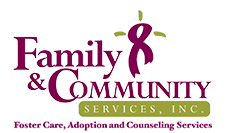Family & Community Services is a licensed child placing agency, facilitating the adoptive placement of children by families in Michigan and Ohio. Family & Community Services, hereafter referred to as F&CS, complies with all applicable laws and rules governing adoptive placements, fees and finances established by state, local and federal monitoring organizations. The agency also complies with regulations and rules existent within the overseas nations with which it is affiliated. F&CS maintains its own intercountry and domestic adoption programs and works directly with applicants to complete adoption studies and pre-placement and pre-finalization services required. F&CS also provides comprehensive local service to adoptive families working through other out-of-state intercountry and interstate adoption agencies.
The agency’s primary objective is to provide permanent, responsible families for homeless children. As part of the agency’s commitment to the well being of children, F&CS also provides aid and assistance to agencies and organizations overseas, furnishing medical supplies and other necessary resources for the health and nurturance of children. These programs benefit children awaiting permanent adoptive homes, and also encompass community outreach efforts to assist in maintaining children within their families of origin.
